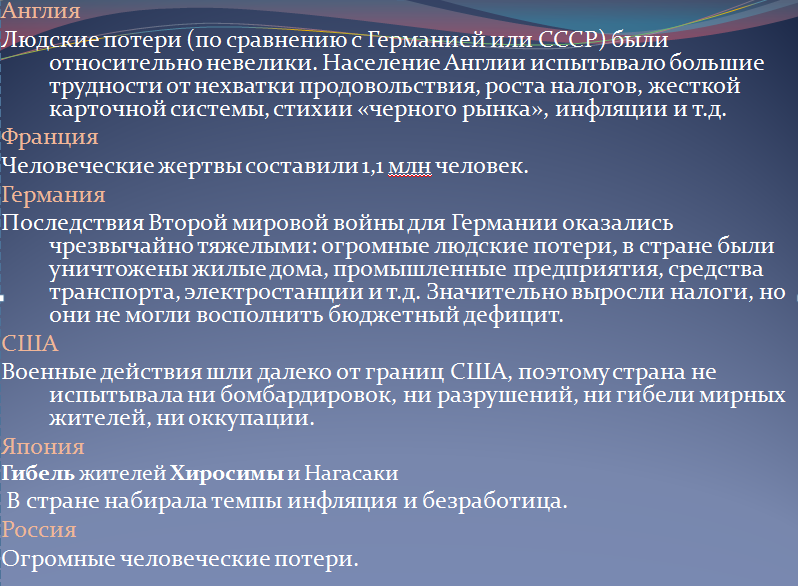- A universal "no" to fascism
- Political results
- Social Outcomes
- Economic results
- Totals for Germany, Italy, Japan in the table
- Results for the USSR and the USA
- Video
Briefly, the results of the Second World War can be divided into economic and political. But the most significant result, of course, was the victory over fascism, the change in priorities, the growth of self-awareness and self-respect of peoples. We will try to describe all of the above in an accessible way a little lower in the text.
A universal "no" to fascism
As a result of the unprecedented war, all countries without exception became aware of the threat that fascism carried. The fascist ideology was condemned, just like its bearers. During the Potsdam (Berlin) conference, which was attended by the largest countries of the anti-Hitler alliance, the composition of the International Military Tribunal was formed, which was supposed to determine the degree of guilt of the leadership of the Third Reich.
The trial (Nuremberg) began on the morning of November 20, 1945, and ended only on October 1, 1946. During it, many of those who led Germany during the war years and pursued an aggressive and cruel policy were charged. Along with war crimes, they were accused of numerous atrocities against peace and humanity.
The Nazis did much more damage to Europe than the medieval Inquisition with its torture and burnings without trial or investigation. About 60 million died, 12 million of which were tortured to death in Nazi concentration camps. Thousands of destroyed cities and small settlements, millions of people who found themselves far from their homeland - this is only a small part of what the leaders of the Third Reich had to answer for.
Having rallied in the face of a common danger in the fight against the brown plague of fascism, society began to strive for a more just and humane world order.
Even before the end of the war, at the Yalta Conference (early 1945), a new international organization, the United Nations, was created. Its main participants were the countries of the anti-Hitler coalition. The main task of the United Nations Organization, just like the League of Nations earlier, was the prevention and peaceful resolution of armed conflicts, disputes, etc.
Politics (results)
No less important was the fact that the world realized the danger of nuclear weapons, seeing the consequences of their use. As a result, many states signed a document under which they pledged never to use weapons of mass destruction.
As for individual countries, as a result of the second world armed conflict, the struggle for independence intensified in most colonies and dominions of Great Britain and other states, but Soviet influence in the world, on the contrary, increased significantly.
Many Eastern European states were led by communists under the leadership of Moscow. And in some states of Western Europe (France, Italy), the communist parties have become more massive and popular. In many ways, this was facilitated by the contribution that the Soviet people made to the victory over Nazi Germany.
Previously strong France after the German occupation lost its greatness. Great Britain, although listed among the winners, was significantly weakened. Japan, Germany and Italy have become completely dependent countries.
All this led to a change in the balance of power and the formation of a bipolar system of world order, in which one pole was the American state, the other - the USSR. The consequence of this new system was the so-called Cold War, which more than once brought the world to the threshold of the Third World War, which would inevitably become the last in the history of mankind.
Social Outcomes World War II

Economy (results)
An important point in the economic results of World War II was the final transition of world financial dominance from European states to the United States.
During the conflict, to one degree or another, all the states that took part in it suffered. The biggest losses were suffered by the economy of the USSR and European states. Japan and Great Britain suffered less, although they had to deal with the consequences of regular bombing.
The only exception was the United States, since the hostilities did not affect their territory. Less than others affected by the war, the States, in the first years after the conflict, provided all possible assistance to the countries of Europe. This allowed the American economy to quickly reorganize on a peaceful footing.
As a result, a new international financial system was formed, according to which the US dollar became the world currency, along with gold.
The emergence of modern international financial organizations, in particular, the International Monetary Fund, also belongs to the post-war period.
